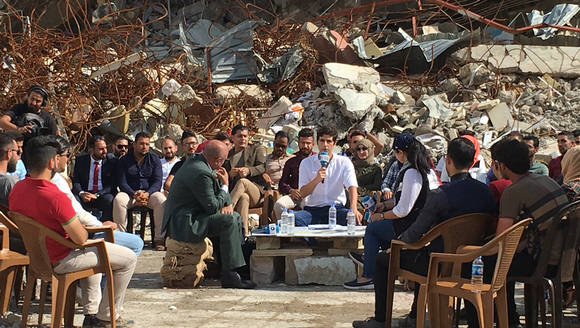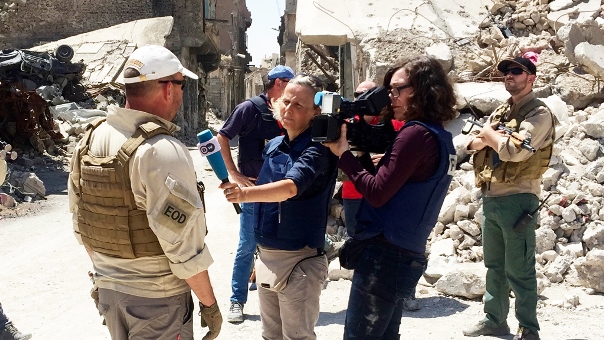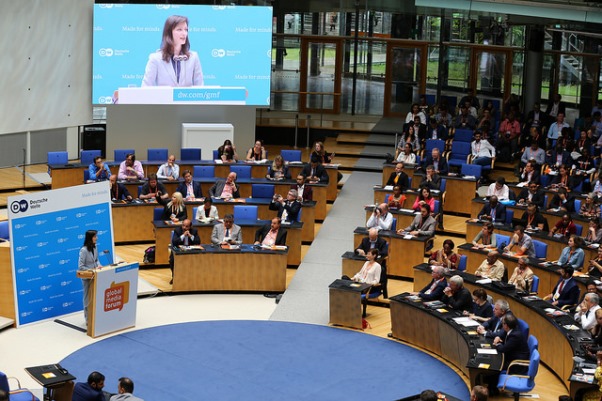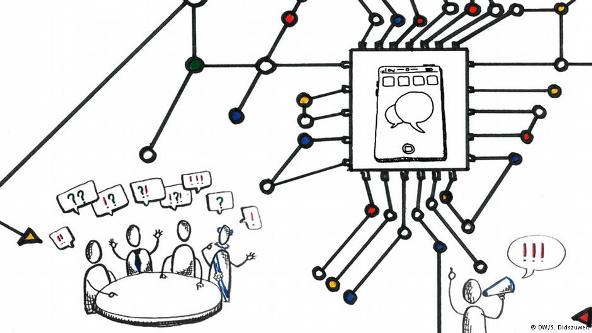DW shares the powerful story of Islamic State survivors
In the barren region around Mount Sinjar mountain in the north of Iraq, two DW reporters were able to capture the harrowing story of a Yazidi woman who survived two years in the captivity of the so-called Islamic State (IS).
Opressed, Enslaved, Forgotten: Yazidi’s of Northern Iraq, brings viewers to a remote place with an intimate piece of reporting that captures how the suffering of one individual symbolizes the larger impact of genocide.
The DW reporters visited the Yazidi woman and the remainder her family at the Sar-Dashte refugee camp on the plateau of Mount Sinjar and recorded their story of survival. Describing the family’s personal tragedy along with an intimate portrayal of their everyday lives and their perspective for the future provides viewers a unique experience.
“We are making a forgotten story visible again,” said DW journalist Sandra Petersmann. “On every platform we need to captivate our audience with emotion and information.”
Although the world knows about the atrocities committed by IS, in-depth storytelling delivers a perspective that has an emotional effect on viewers.
The report is a great example of the work DW’s journalists perform to share stories of forgotten people with the entire world. It will be broadcast in all four DW languages and can be seen in the DW Media Center.
Four things you may have missed at the 2018 DW Global Media Forum
The 2018 Global Media Forum wrapped up last week with over 2,500 guests from all over the world gathering in Bonn for three days of learning and networking. You probably caught the keynote speeches, and the DW Freedom of Speech Award , but here are four events at the 2018 Global Media Forum you may have missed.
1. Peace With the Taliban: A Compromise on Human Rights?
On Tuesday, former Afghan President Ahmed Karzai was joined by DW journalists and the German envoy to Afghanistan to discuss the potential for peace with the Taliban in a country beset by continuous conflict. The discussion provided first-person insight into a complicated and unstable region from someone who has played an integral part in its politics.
2. Reporting terror: Who sees what, when and why?
Four journalists with experience in reporting from crisis regions around the world gathered for a panel discussion on Monday to discuss how stories about terrorism are portrayed unequally in the media. For example, the Charlie Hebdo attack dominated the media, while 2,000 people killed by terrorists in Nigeria at the same time didn’t make the news cycle. The panel provided a riveting, inside look at challenges and dangers of delivering information from dangerous areas while looking for an audience.
3. Threats and opportunities of increasing isolationism to international power relations
At a plenary discussion on Tuesday, a panel of prominent journalists and academics discussed the trend of isolationism, especially with Donald Trump’s “America First” politics. One speaker discussed the danger of the US losing soft power on the world stage and being ignored internationally. The panel provided a preview of a future that looks a lot different than today.
4. Lie Detectors
The final day of the Global Media Forum was devoted to media innovation. As part of the Innovation Lab day, DW Akademie invited the media competence organization Lie Detectors, which goes to schools and teaches children media literacy and how to spot fake news stories from real reporting. As online news and social media are the primary sources for a new generation of media users, this service will become even more valuable.
Market roundup: June 2018
Zapovednik, DW’s Russian-language, animated political satire, is resonating with Russian audiences and is one of the most viewed videos on DW’s Russian partner website Ekho Moskvy. The 12-minute episodes tackle current political issues and put a funny and entertaining spin on important topics. By using animated satire, DW can convey an alternative perspective in the Russian media landscape. DW’s partner Ekho Moskvy is a reliable source of independent news in Russia.
Asia
DW’s English channel is once again available on the leading Malaysian Pay TV provider ASTRO. Around 1 million subscribers can now access DW on the providers OTT platform Astro Go.
The Vietnamese cable provider HTV-TMS in Ho Chi Minh City is providing DW’s English channel to 600,000 subscribers.
DW’s partner in Thailand PSI is broadcasting Tomorrow Today, Global 3000, Drive It, In Good Shape and Euromaxx to an estimated 18 million households.
The trends will shape the future of journalism
What are the tools that will shape journalism in the future? What are the social trends that will guide how people think and interact with the media? During the 2018 DW Global Media Forum at the Media Innovation Lab Day (MILD), DW innovation is inviting innovators and experts for discussions and live demonstrations of ideas and technology.
One of the most important changes facing media is a generational shift in how people understand and use information and communication tools. MILD is putting this at the forefront with a discussion on “digital disruptors” from the founder of a platform called “After the Millennials,” which focuses on how a new generation is set to completely transform industry.
The usage habits, expectations and interactivity vis-à-vis mass media from the so-called “Generation-Z” will be what journalists, producers and developers will dealing with in 10 years. Organizations that can remain prescient, are those posed to succeed.
Transformative technologies like artificial intelligence in newsrooms and the use of bots and drones will also be discussed with interactive presentations. Participants will see first hand how new technology will look, before it becomes a standard feature in workplaces.
As an international media organization, DW stays ahead of trends that will become standards in the future. At the Global Media Forum and MILD, guests from around the world will have a valuable opportunity to network and create new ideas for the future.
Shababtalk engages Iraqi youth in Mosul
 DW’s talk show for Arab youth, Shababtalk, recently produced a segment in the Iraqi city of Mosul together with local leaders, NGOs and 250 Iraqi students. Mosul was liberated from the so-called Islamic State (IS) in June 2017, and a lot of the city is still in ruins.
DW’s talk show for Arab youth, Shababtalk, recently produced a segment in the Iraqi city of Mosul together with local leaders, NGOs and 250 Iraqi students. Mosul was liberated from the so-called Islamic State (IS) in June 2017, and a lot of the city is still in ruins.
The host of Shababtalk, Jaafar Abdul Karim, said that the scene in Mosul’s destroyed old town was very shocking – even after his extensive experience in different crisis regions. The discussion centered on the challenges of rebuilding the city, dealing with the influx of refugees and the rights of minority people in the region. DW worked with local Iraqi production partner Alrasheed TV on the special episode.
Even during the conflict, DW provided a sense of connection to the outside world. One participant in the discussion said that Shababtalk was his “window to the world” during the IS occupation of the city.
The series has made an impact in recent years with young audiences from around the Arab world. The visit to a city like Mosul so directly affected by conflict is a big step for Shababtalk and is an indicator of how important free media and international broadcasting is to regions trying to develop positively for the future.












Feedback